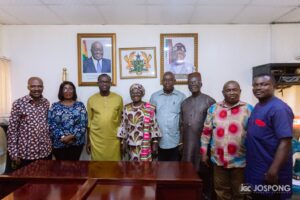Jospong Group of Companies has assured the Lagos State Government that it will employ Nigerians to manage the waste treatment facility.
Speaking with the Managing Director of Waste Landfills, a subsidiary of Jospong Group, Mr. Peter Dagadu affirmed that as per practice, the Group always employs the locals to manage its facilities in the countries where it operates.
“95% of the staff that will manage the facility will be Nigerians, we will not bring workers from anywhere,” he assured.
He stated that they are looking forward to concluding the feasibility studies and designs so they can start the procurement process of contracting contractors to start developing the site.
The Managing Director of Sewage Systems Ghana, Ing. Mrs. Florence Cobbold, on her part said they will work with the local associations to ensure they agree on the appropriate technology that is suitable for the Nigerian market.
In another development, the Group paid a courtesy call on Ghana’s Consul-General to Lagos, Hajia Samata Gifty Bukari.
The visit led by the Executive Chairman, Dr. Joseph Siaw Agyepong, was to introduce the Group and inform the Consulate that JGC has reached an agreement with the Lagos State Government to build an integrated waste recycling plant in Lagos, Nigeria.

According to Dr. Agyepong, JGC had made some mistakes in the past when it ventured into some countries without consulting Ghana’s missions in those countries.
“We have learnt our lessons from past mistakes when we didn’t consult Ghana’s missions in foreign countries so we are here to do the right thing,” he asserted.
He announced that the Group has started advocacy activities and community engagements to sensitize the people in the community where the plant will be located.
Dr. Agyepong promised the Consul-General that JGC will continue to engage the Consulate and keep it updated on the needed information on the progress of work and other activities.
The Executive Chairman also announced the Group’s interest to participate in the Consulate’s Independence Day exhibition scheduled for March 23, 2024.
Ghana’s Consul-General to Lagos, Hajia Samata Gifty Bukari, assured the Executive Chairman of the support from her office.
She noted that her office will assist JGC in every way to succeed and eventually expand to other states.
The National President of the Ghanaian Community in Nigeria, Mr. Frank Ekow Quaye, who was in the meeting also assured the Group of their support to ensure their success in Nigeria.
Mr. Quaye who has been living in Nigeria for over 40 years noted that he and his executives will share experiences and guide the JGC’s team to efficiently navigate the Nigerian market.
The Jospong Group of Companies this week entered into agreement with the Lagos State Government through the Ministry of Environment and Water Resources to build waste treatment plants in Lagos, Nigeria.
The integrated waste treatment facility will help to transform the environmental situation of Africa’s most populous city.
The landmark agreement was formalized with the signing of a Memorandum of Understanding between the Jospong Group of Companies led by its Executive Chairman, Dr. Joseph Siaw Agyepong and the Commissioner of the Lagos State Ministry of Environment and Water Resources, Tokunbo Wahab in Lagos on Monday February 26, 2024.
Per the MoU, Jospong Group will establish a Material Recovery Facility; Mobile Transfer loading stations; Repurposing of current Olusosun landfill, Supply of self-tipping tricycles; and Bin manufacturing and plastic recycling plant to streamline recyclable activities.
According to a report by the Lagos State Waste Management Agency, Lagos State produces approximately 13,000 tons of waste per day.
The consequences of poor sanitation are dire, ranging from the spread of waterborne diseases to environmental degradation, and disproportionately affecting the most vulnerable segments of our society, including women, children, and the elderly.
In Ghana, JGC has established 58 sustainable sanitation infrastructures for liquid, medical, plastics, and municipal solid waste including 16 integrated recycling and compost plants. These plants produce compost which is also helping to boost the agricultural sector of the economy.










